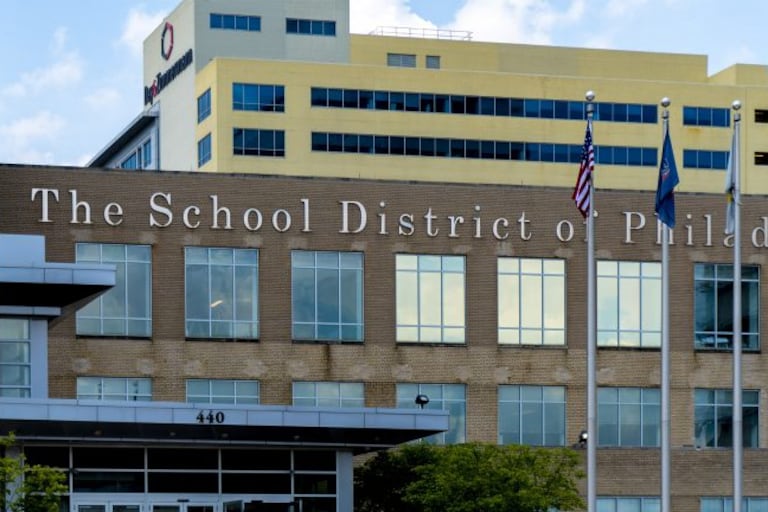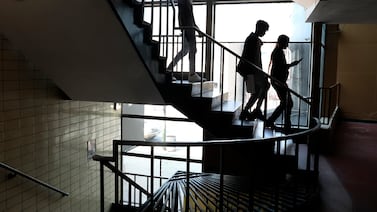A large share of Philadelphia parents say schools are on the wrong track and the next mayor must exert more control over education, says a new report from the nonprofit organization Elevate 215.
The group, which awards grants for school improvement, polled 400 Philadelphia parents and guardians with children in district, charter, and private schools, as well as a handful of home-schoolers. Nine in 10 agreed that “a candidate’s plan for improving the education system in the city is key to earning my support.”
Nearly two-thirds of those polled feel that the city schools are “on the wrong track” — although only 27% feel that way about their own child’s school and just 42% said that Philadelphia high school students are well prepared “to thrive in life.”
The poll comes as the city prepares to elect a new mayor to succeed Jim Kenney, with the party primaries scheduled for May 16. There are 12 Democrats and one Republican running. Because the city has seven times as many Democrats as Republicans, winning the Democratic primary is considered tantamount to winning the election.
In mayoral forums around the city, public safety has emerged as the top concern; the city had 516 homicides in 2022 and already more than 100 this year, including several incidents involving students going to or from school.
Those questioned in the Elevate 215 poll were pessimistic about how well schools prepared students for the next step in their education or career. Just 46% said they thought students were well prepared to enter a four-year college and 44% said they were prepared for a full-time job. Just over half of those surveyed said that students were prepared for a two-year community college or technical school.
The Elevate 215 report emphasized the mayoral role in education, saying the mayor must “set a vision, appoint board members aligned with that vision, and be held accountable for student outcomes.”
Asked to rank their priorities in choosing a school, 91% said safety — both in and on the way to school — was “very important.” Teacher quality and curriculum and instruction followed close behind. Philadelphia parents have a lot of educational options; in addition to the ability to choose charter or private schools, parents can also apply to attend a district-run school outside their neighborhood.
‘We have to go back to listening to our parents and planning for what our students need to thrive in life,” said Stacy Holland, Elevate 215’s executive director, who previously ran the Fund for the School District of Philadelphia, its fundraising arm.
Elevate 215 started out as the Philadelphia School Partnership, which raised money from foundations and philanthropists and promoted charter school growth in the city, although it has distributed grants to schools of all types.
Besides setting a vision for improving schools, the group recommends that the next mayor “increase the number of high quality schools” by improving curriculum and services, developing a plan for modern facilities, improving student safety focusing on teacher recruitment and retention, and advocating for equitable state funding for city schools
A Commonwealth Court judge last month ruled that Pennsylvania’s system for funding education is unconstitutional because it creates wide gaps between wealthy and poor districts and ordered an overhaul.
Unlike every other district in the Commonwealth, the appointed Board of Education cannot raise revenue for the schools, and must rely on the city, state, and federal government for its funding. In Philadelphia, the district must plead its case before City Council every year. The district spends less per student than most surrounding suburban districts despite having students who are primarily Black and brown and come from low-income families.
Currently, about 38% of the district’s revenue comes from city sources, but the survey did not ask whether the respondents would support more local taxes to raise money for the schools. Now, the district gets 55% of the property tax revenue as well as money from the use-and-occupancy and liquor-by-the-drink taxes.
Several of the mayoral candidates said at a forum last week that they would support raising the district’s share of the property tax to 60%.
Holland said she would love to hear the candidates talk about creative ways to “fill the funding gap” for schools.
“Whether that is taxes, or more alignment with the city budget, being creative about filling the gap is something we should look for,” she said.
She said, “We’re educating a population of young people who are living in deep poverty and schools don’t have the resources to meet their needs. If we’re not owning up to that, what are we doing? [Concentrated] poverty changes the game, and we’ve got to rise to that occasion.”
Dale Mezzacappa is a senior writer for Chalkbeat Philadelphia, where she covers K-12 schools and early childhood education in Philadelphia. Contact Dale at dmezzacappa@chalkbeat.org.







